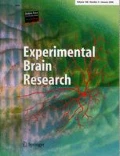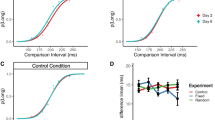Abstract
The acquisition of many perceptual skills proceeds over a course of days. However, little is known about how much daily training is needed for such learning to occur. Here we investigated this question by examining how varying the number of training trials per day affected learning over multiple days on two auditory discrimination tasks: frequency discrimination and temporal-interval discrimination. For each task, we compared improvements in discrimination thresholds between different groups of listeners who were trained for either 360 or 900 trials per day for 6 days. Improvement on frequency discrimination required >360 trials of training per day while learning on temporal-interval discrimination occurred with 360 training trials per day, and additional daily practice did not increase the amount of improvement. It therefore appears that the accumulation of improvement over days on auditory discrimination tasks may require some critical amount of training per day, that training beyond that critical amount yields no additional learning on the trained condition, and that the critical amount of training needed varies across tasks. These results imply that perceptual skills are transferred from short- to long-term memory (consolidated) daily, but only if a task-specific initiation requirement has been met.


Similar content being viewed by others
References
Ahissar M, Hochstein S (1997) Task difficulty and the specificity of perceptual learning. Nature 387:401–406
Brashers-Krug T, Shadmehr R, Bizzi E (1996) Consolidation in human motor memory. Nature 382:252–255
Brechmann A, Scheich H (2005) Hemispheric shifts of sound representation in auditory cortex with conceptual listening. Cereb Cortex 15:578–587
Caithness G, Osu R, Bays P, Chase H, Klassen J, Kawato M, Wolpert DM, Flanagan JR (2004) Failure to consolidate the consolidation theory of learning for sensorimotor adaptation tasks. J Neurosci 24:8662–8671
Campbell RA, Small AM (1963) Effect of practice and feedback on frequency discrimination. J Acoust Soc Am 35:1511–1514
Cohen J (1988) Statistical power analysis for the behavioral sciences. In: The concepts of power analysis. Lawrence Erlbaum Assoc, Hillsdale
Delhommeau K, Micheyl C, Jouvent R, Collet L (2002) Transfer of learning across durations and ears in auditory frequency discrimination. Percept Psychophys 64:426–436
Demany L (1985) Perceptual learning in frequency discrimination. J Acoust Soc Am 78:1118–1120
Grimault N, Micheyl C, Carlyon RP, Bacon SP, Collet L (2003) Learning in discrimination of frequency or modulation rate: generalization to fundamental frequency discrimination. Hear Res 184:41–50
Hauptmann B, Karni A (2002) From primed to learn: the saturation of repetition priming and the induction of long-term memory. Brain Res Cogn Brain Res 13:313–322
Hauptmann B, Reinhart E, Brandt SA, Karni A (2005) The predictive value of the leveling off of within session performance for procedural memory consolidation. Brain Res Cogn Brain Res 24:181–189
Irvine DR, Martin RL, Klimkeit E, Smith R (2000) Specificity of perceptual learning in a frequency discrimination task. J Acoust Soc Am 108:2964–2968
Karmarkar UR, Buonomano DV (2003) Temporal specificity of perceptual learning in an auditory discrimination task. Learn Mem 10:141–147
Karni A, Sagi D (1993) The time course of learning a visual skill. Nature 365:250–252
Krakauer JW, Ghilardi MF, Ghez C (1999) Independent learning of internal models for kinematic and dynamic control of reaching. Nat Neurosci 2:1026–1031
Levitt H (1971) Transformed up-down methods in psychoacoustics. J Acoust Soc Am 49:467–477
McGaugh JL (2000) Memory–a century of consolidation. Science 287:248–251
Meegan DV, Aslin RN, Jacobs RA (2000) Motor timing learned without motor training. Nat Neurosci 3:860–862
Nagarajan SS, Blake DT, Wright BA, Byl N, Merzenich MM (1998) Practice-related improvements in somatosensory interval discrimination are temporally specific but generalize across skin location, hemisphere, and modality. J Neurosci 18:1559–1570
Nenadic I, Gaser C, Volz HP, Rammsayer T, Hager F, Sauer H (2003) Processing of temporal information and the basal ganglia: new evidence from fMRI. Exp Brain Res 148:238–246
Ofen-Noy N, Dudai Y, Karni A (2003) Skill learning in mirror reading: how repetition determines acquisition. Brain Res Cogn Brain Res 17:507–521
Roth DA-E, Kishon-Rabin L, Hildesheimer M, Karni A, Roth DA-Erini, Roth DA (2005) A latent consolidation phase in auditory identification learning: time in the awake state is sufficient. Learn Memory 12:159–164
Savion-Lemieux T, Penhune VB (2005) The effects of practice and delay on motor skill learning and retention. Exp Brain Res 161:423–431
Seitz AR, Yamagishi N, Werner B, Goda N, Kawato M, Watanabe T (2005) Task-specific disruption of perceptual learning. Proc Natl Acad Sci USA 102:14895–14900
Shadmehr R, Brashers-Krug T (1997) Functional stages in the formation of human long-term motor memory. J Neurosci 17:409–419
Walker MP, Brakefield T, Hobson JA, Stickgold R (2003) Dissociable stages of human memory consolidation and reconsolidation. Nature 425:616–620
Wright BA (1998) Generalization of auditory-discrimination learning. In: Association for research in otolaryngology abstracts, p 413
Wright BA, Fitzgerald MB (2005) Learning and generalization on five basic auditory discrimination tasks as assessed by threshold changes. In: Pressnitzer D, de Cheveigne A, McAdams S, Collet L (eds) Auditory signal processing: physiology, psychoacoustics, and models. Springer, New York, pp 510–516
Wright BA, Buonomano DV, Mahncke HW, Merzenich MM (1997) Learning and generalization of auditory temporal-interval discrimination in humans. J Neurosci 17:3956–3963
Zatorre RJ, Belin P, Penhune VB (2002) Structure and function of auditory cortex: music and speech. Trends Cogn Sci 6:37–46
Acknowledgments
We thank Karen Banai, David Brandel, Julia Huyck, Julia Mossbridge, Jeanette Ortiz, Yuxuan Zhang, and two anonymous reviewers for helpful comments on earlier drafts of this paper. Matt Fitzgerald, Jeanette Ortiz, and Chris Stewart collected much of the data reported here. This work was supported by NIH/NIDCD.
Author information
Authors and Affiliations
Corresponding author
Rights and permissions
About this article
Cite this article
Wright, B.A., Sabin, A.T. Perceptual learning: how much daily training is enough?. Exp Brain Res 180, 727–736 (2007). https://doi.org/10.1007/s00221-007-0898-z
Received:
Accepted:
Published:
Issue Date:
DOI: https://doi.org/10.1007/s00221-007-0898-z




